Abstract
Bacteria-derived human leukocyte interferon (IFN) subtypes, IFN-alpha A, -alpha B, and -alpha D, and two hybrid IFNs, IFN-alpha AD and -alpha DA, were examined for both in vitro and in vivo antiviral activity. Two of these materials in highly purified form (IFN-alpha D and -alpha D) protect mice against lethal doses of encephalomyocarditis virus infection. A single dose of 1 microgram of protein of IFN-alpha D 3 h before infection conferred protection in both BDF1 and CD-1 mice against encephalomyocarditis virus infection, and multiple treatments with IFN-alpha D or IFN-alpha AD extend the mean survival time of infected mice. On a weight basis, IFN-alpha AD was approximately 100-fold more effective than IFN-alpha D. There is a direct correlation between the antiviral activity of the various human IFN species in L-929 cells and in mice for both single and multiple treatments before infection, but none of the cloned human IFN subtypes were effective when administered 24 h after infection. Mixtures of the two parental materials, IFN-alpha A and -alpha D, were not as protective as the hybrid molecule IFN-alpha AD, suggesting that IFNs with unique and altered species specificity can be produced by recombinant DNA methods.
Full text
PDF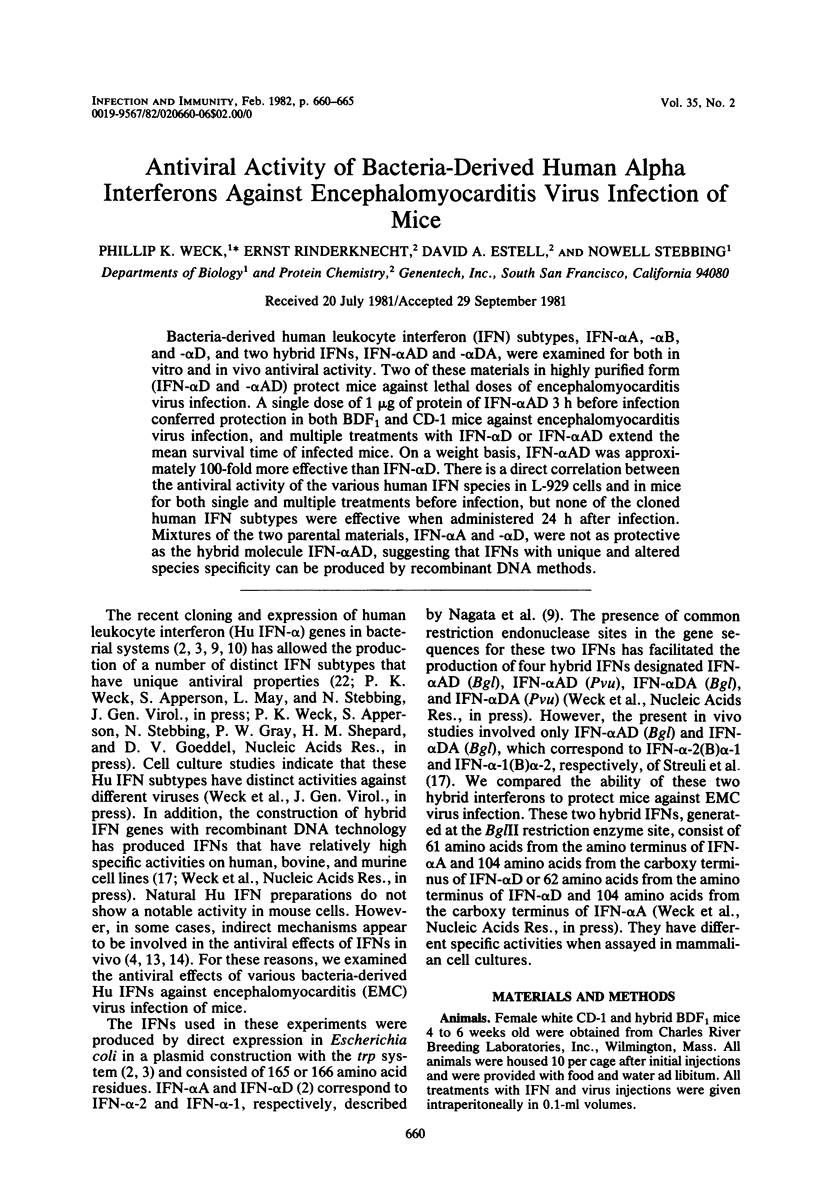
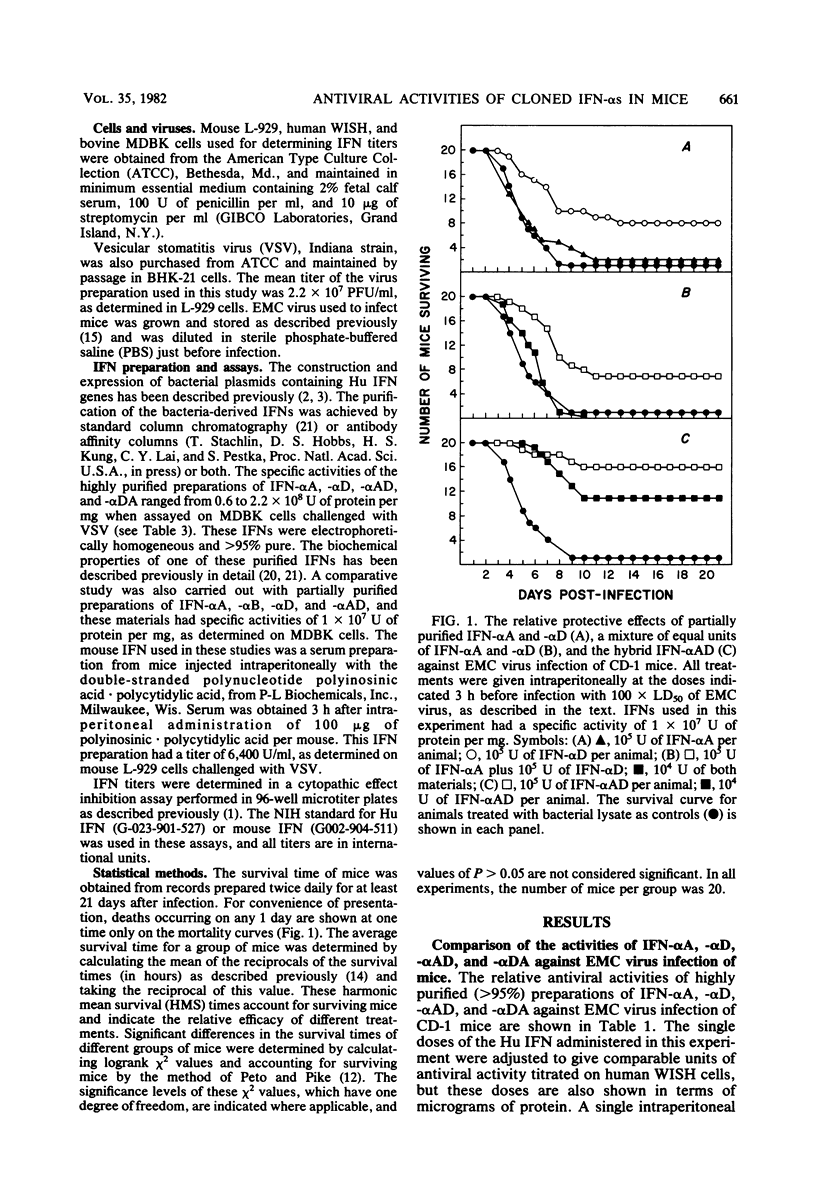
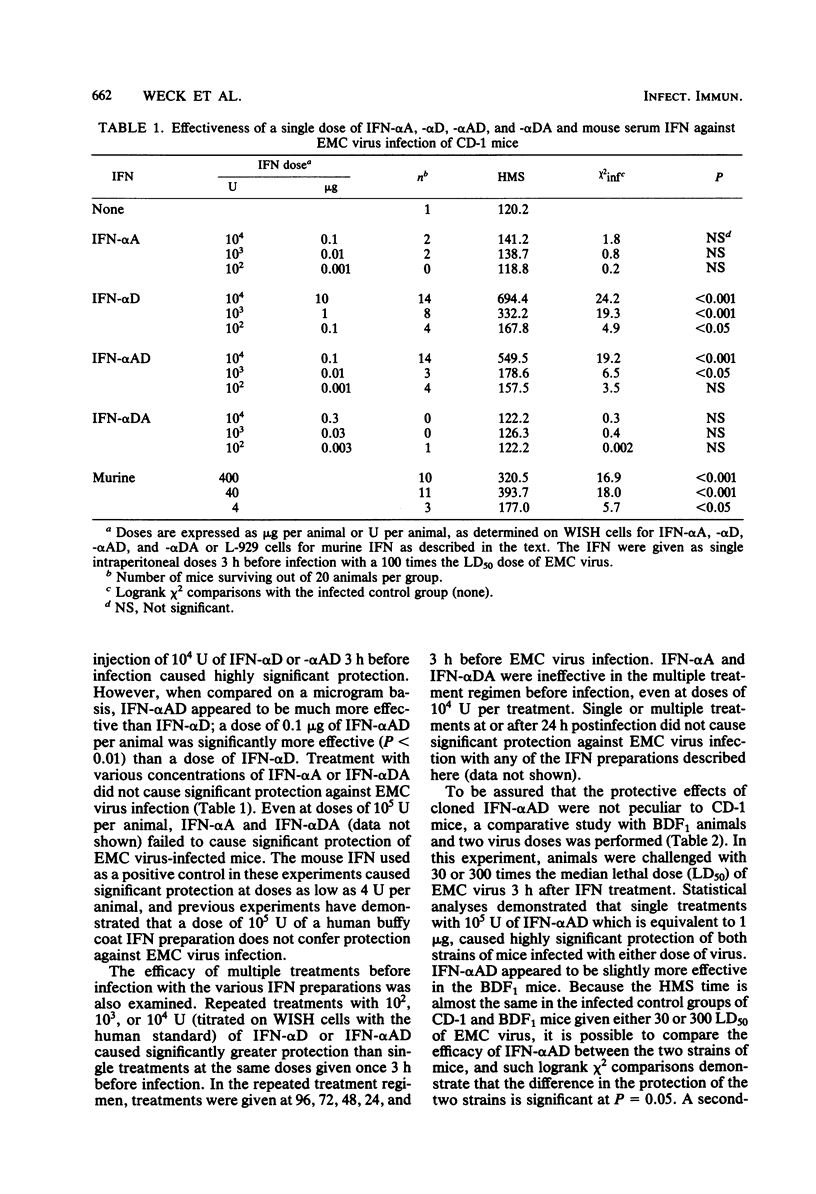
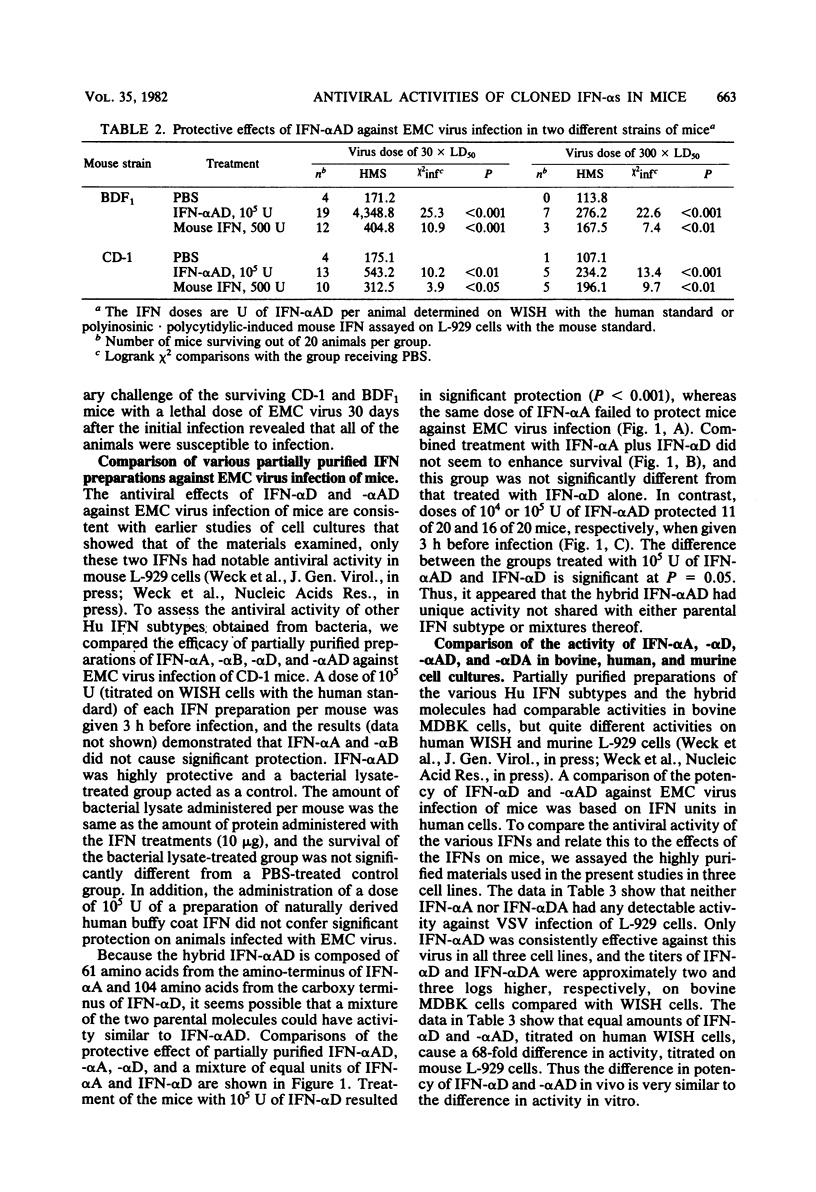
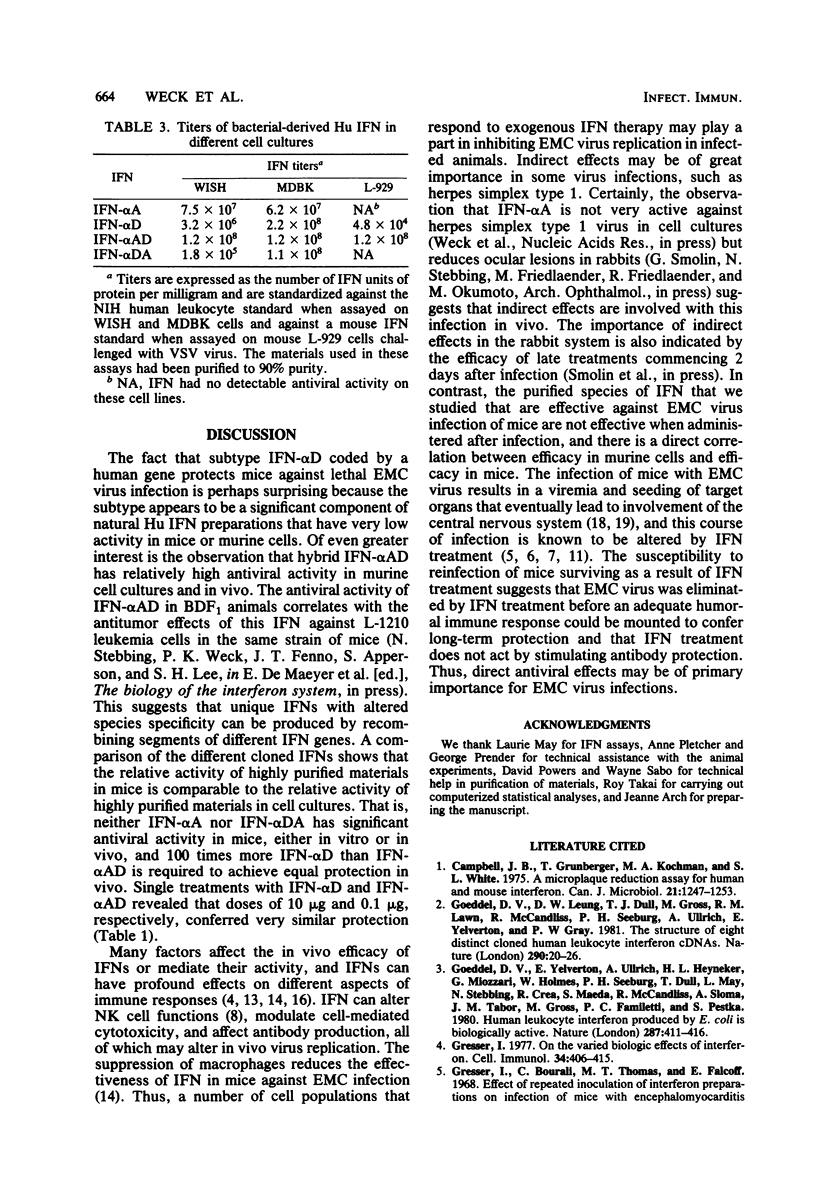
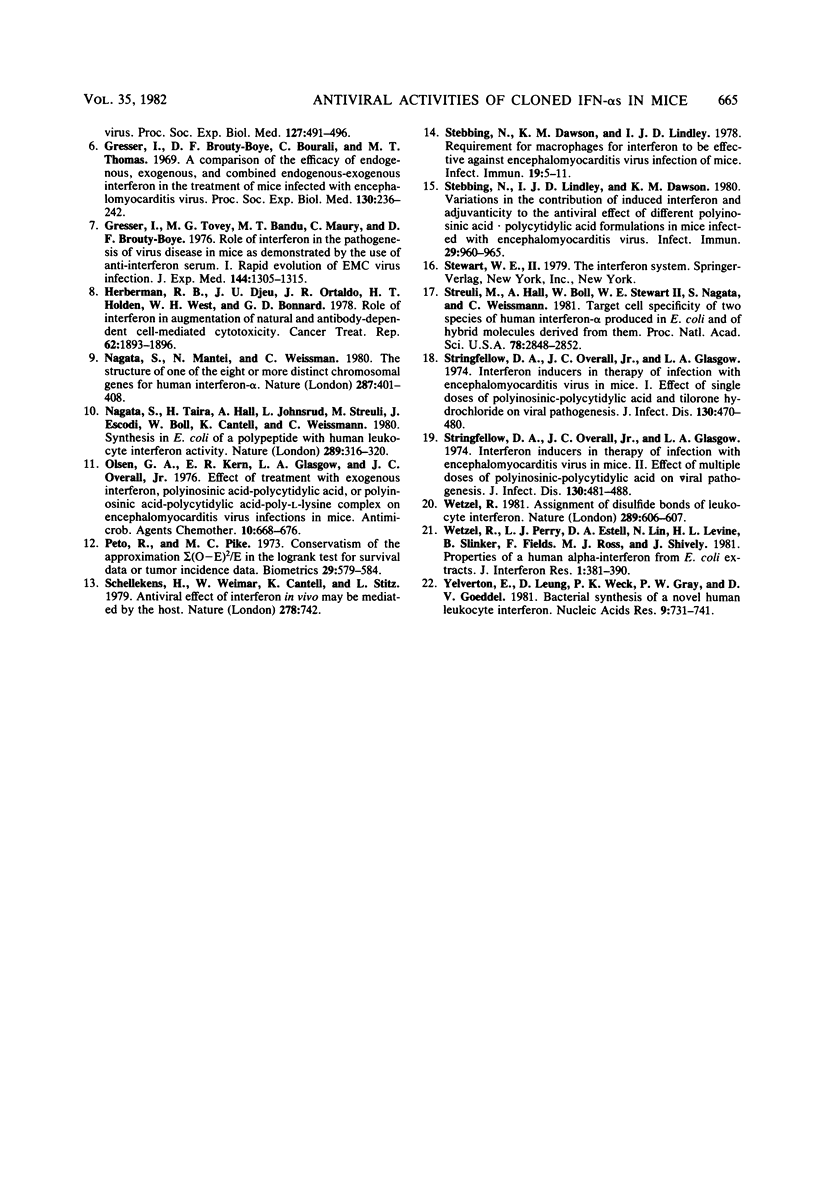
Selected References
These references are in PubMed. This may not be the complete list of references from this article.
- Campbell J. B., Grunberger T., Kochman M. A., White S. L. A microplaque reduction assay for human and mouse interferon. Can J Microbiol. 1975 Aug;21(8):1247–1253. doi: 10.1139/m75-186. [DOI] [PubMed] [Google Scholar]
- Goeddel D. V., Leung D. W., Dull T. J., Gross M., Lawn R. M., McCandliss R., Seeburg P. H., Ullrich A., Yelverton E., Gray P. W. The structure of eight distinct cloned human leukocyte interferon cDNAs. Nature. 1981 Mar 5;290(5801):20–26. doi: 10.1038/290020a0. [DOI] [PubMed] [Google Scholar]
- Goeddel D. V., Yelverton E., Ullrich A., Heyneker H. L., Miozzari G., Holmes W., Seeburg P. H., Dull T., May L., Stebbing N. Human leukocyte interferon produced by E. coli is biologically active. Nature. 1980 Oct 2;287(5781):411–416. doi: 10.1038/287411a0. [DOI] [PubMed] [Google Scholar]
- Gresser I., Bourali C., Thomas M. T., Falcoff E. Effect of repeated inoculation of interferon preparations on infection of mice with encephalomyocarditis virus. Proc Soc Exp Biol Med. 1968 Feb;127(2):491–496. doi: 10.3181/00379727-127-32723. [DOI] [PubMed] [Google Scholar]
- Gresser I., Fontaine-Brouty-Boyé D., Bourali C., Thomas M. T. A comparison of the efficacy of endogenous, exogenous, and combined endogenous-exogenous interferon in the treatment of mice infected with encephalomyocarditis virus. Proc Soc Exp Biol Med. 1969 Jan;130(1):236–242. doi: 10.3181/00379727-130-33529. [DOI] [PubMed] [Google Scholar]
- Gresser I. On the varied biologic effects of interferon. Cell Immunol. 1977 Dec;34(2):406–415. doi: 10.1016/0008-8749(77)90262-3. [DOI] [PubMed] [Google Scholar]
- Gresser I., Tovey M. G., Bandu M. E., Maury C., Brouty-Boyé D. Role of interferon in the pathogenesis of virus diseases in mice as demonstrated by the use of anti-interferon serum. I. Rapid evolution of encephalomyocarditis virus infection. J Exp Med. 1976 Nov 2;144(5):1305–1315. doi: 10.1084/jem.144.5.1305. [DOI] [PMC free article] [PubMed] [Google Scholar]
- Herberman R. B., Djeu J. Y., Ortaldo J. R., Holden H. T., West W. H., Bonnard G. D. Role of interferon in augmentation of natural and antibody-dependent cell-mediated cytotoxicity. Cancer Treat Rep. 1978 Nov;62(11):1893–1896. [PubMed] [Google Scholar]
- Nagata S., Mantei N., Weissmann C. The structure of one of the eight or more distinct chromosomal genes for human interferon-alpha. Nature. 1980 Oct 2;287(5781):401–408. doi: 10.1038/287401a0. [DOI] [PubMed] [Google Scholar]
- Nagata S., Taira H., Hall A., Johnsrud L., Streuli M., Ecsödi J., Boll W., Cantell K., Weissmann C. Synthesis in E. coli of a polypeptide with human leukocyte interferon activity. Nature. 1980 Mar 27;284(5754):316–320. doi: 10.1038/284316a0. [DOI] [PubMed] [Google Scholar]
- Olsen G. A., Kern E. R., Glasgow L. A., Overall J. C. Effect of treatment with exogenous interferon, polyinosinic acid-polyctyidylic acid or polyinosinic acid-polycytidylic acid-poly-L-lysine complex on encephalomyocarditis virus infections in mice. Antimicrob Agents Chemother. 1976 Oct;10(4):668–676. doi: 10.1128/aac.10.4.668. [DOI] [PMC free article] [PubMed] [Google Scholar]
- Peto R., Pike M. C. Conservatism of the approximation sigma (O-E)2-E in the logrank test for survival data or tumor incidence data. Biometrics. 1973 Sep;29(3):579–584. [PubMed] [Google Scholar]
- Schellekens H., Weimar W., Cantell K., Stitz L. Antiviral effect of interferon in vivo may be mediated by the host. Nature. 1979 Apr 19;278(5706):742–742. doi: 10.1038/278742a0. [DOI] [PubMed] [Google Scholar]
- Stebbing N., Dawson K. M., Lindley I. J. Requirement for macrophages for interferon to be effective against encephalomyocarditis virus infection of mice. Infect Immun. 1978 Jan;19(1):5–11. doi: 10.1128/iai.19.1.5-11.1978. [DOI] [PMC free article] [PubMed] [Google Scholar]
- Stebbing N., Lindley I. J., Dawson K. M. Variations in the contribution of induced interferon and adjuvanticity to the antiviral effect of different polyinosinic acid . polycytidylic acid formulations in mice infected with encephalomyocarditis virus. Infect Immun. 1980 Sep;29(3):960–965. doi: 10.1128/iai.29.3.960-965.1980. [DOI] [PMC free article] [PubMed] [Google Scholar]
- Streuli M., Hall A., Boll W., Stewart W. E., 2nd, Nagata S., Weissmann C. Target cell specificity of two species of human interferon-alpha produced in Escherichia coli and of hybrid molecules derived from them. Proc Natl Acad Sci U S A. 1981 May;78(5):2848–2852. doi: 10.1073/pnas.78.5.2848. [DOI] [PMC free article] [PubMed] [Google Scholar]
- Stringfellow D. A., Overall J. C., Jr, Glasgow L. A. Interferon inducers in therapy of infection with encephalomyocarditis virus in mice. I. Effect of single doses of polyriboinosinic-polyribocytidylic acid and tilorone hydrochloride on viral pathogenesis. J Infect Dis. 1974 Nov;130(5):470–480. doi: 10.1093/infdis/130.5.470. [DOI] [PubMed] [Google Scholar]
- Stringfellow D. A., Overall J. C., Jr, Glasgow L. A. Interferon inducers in therapy of infection with encephalomyocarditis virus in mice. II. Effect of multiple doses of polyriboinosinic-polyribocytidylic acid on viral pathogenesis. J Infect Dis. 1974 Nov;130(5):481–488. doi: 10.1093/infdis/130.5.481. [DOI] [PubMed] [Google Scholar]
- Wetzel R. Assignment of the disulphide bonds of leukocyte interferon. Nature. 1981 Feb 12;289(5798):606–607. doi: 10.1038/289606a0. [DOI] [PubMed] [Google Scholar]
- Wetzel R., Perry L. J., Estell D. A., Lin N., Levine H. L., Slinker B., Fields F., Ross M. J., Shively J. Properties of a human alpha-interferon purified from E. coli extracts. J Interferon Res. 1981;1(3):381–390. doi: 10.1089/jir.1981.1.381. [DOI] [PubMed] [Google Scholar]
- Yelverton E., Leung D., Weck P., Gray P. W., Goeddel D. V. Bacterial synthesis of a novel human leukocyte interferon. Nucleic Acids Res. 1981 Feb 11;9(3):731–741. doi: 10.1093/nar/9.3.731. [DOI] [PMC free article] [PubMed] [Google Scholar]


